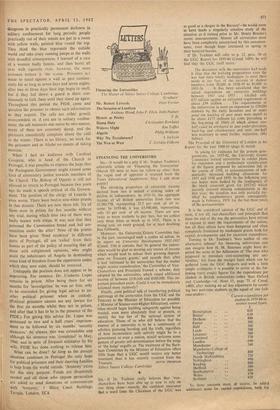Financing the Universities
7'he Master of Sidney .Susse x College, Cambridge, 'Graduate'
Mr. Robert Edwards Peter Forster The Invasion 01 Landicea •
Anthony Blond, John F. Elkin, John Pudney
Hymns as Poetry T. D.
Stamp Duty Christopher Rowland Widows Might Rae loftier Algeria Philip Williams Why No Translations? J. Jackson The Wen or Wart C. Gordon Falloon
FINANCING THE UNIVERSITIES
SIR,-It would be a pity if Mr. Stephen Toulmin's admirable article on 'Financing the Universities' (March 30) were to have no follow-up other than the vague nod of approval it received from the Times Educational Supplement. May I add three points?
The shrinking proportion of university income derived from fees is indeed a striking index of decline in independence. In 1935-36, the aggregate income of all British universities from fees was £1,969,778, representing 32.5 per cent, of all in- come. In 1959-60, it was 0,990,466, representing only 10 per cent. of all income. There are now twice as many students to pay fees, but we collect only three times as much as in 1935. There is a strong case, on every ground, for at least doubling fees forthwith.
Moreover, the University 'Grants Committee has,
• in the past, encouraged such a coutse of action. In its report on University Development 1952-1957 (Cmnd. 534) it remarks that 'In general the univer- sities would be glad to develop any source of income which would tend to reduce their growing depend- ence on Treasury grants,' and records that, after it had 'intimated to the universities that the matter might receive consideration,' the Committee of Vice- Chancellors and Principals framed a *scheme, duly adopted by the universities, which raised additional income of between 000,000 and £600,000. This im- portant precedent exists. Could it not be immediately followed more incisively?
Finally, amid political tall( of transferring political patronage of the universities from the UGC and the Treasury to the Minister of Education (or possibly a Minister of Science-cum-Higher-Education), univer- sities should begin building safeguards against being treated, even more absolutely than at present, as merely the top tier of the national system of education. Those of us who still believe that the essence of a university is to be a community of scholars pursuing learning and the truth, regardless of how inconvenient such activity might be to a government or even a nation, would welcome some gesture of greater self-determination before the surge of 'the bulge' engulfs us. The treatment of the Burn- ham Committee by the Minister of Education offers little hope that a UGC would receive any better treatment than it has recently received from the


































 Previous page
Previous page